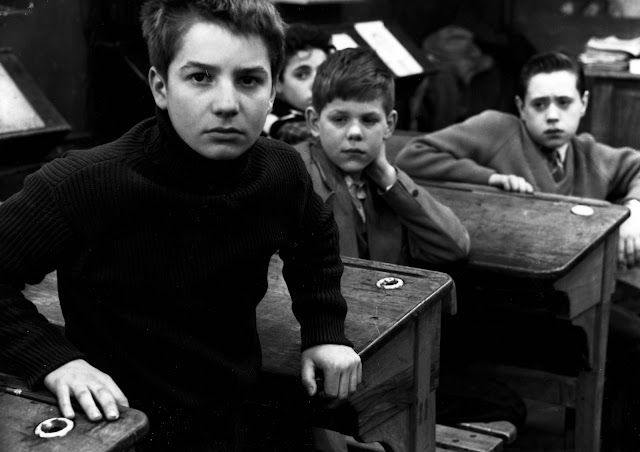The 400 Blows (1959)
Francois Truffaut's "The 400 Blows"
I wasn't sure what to expect going into Francois Truffaut's debut masterwork "The 400 Blows." I was aware that it ignited the French nouvelle vague movement and is considered one of the greatest films ever made. I had never seen a Francois Truffaut film before and I wasn't sure if there was a specific style he operated in. I also was aware that Jean Vigo's 1933 short film "Zero de Conduit" was a major influence on "The 400 Blows." Sufficive to say, I could tell that it was. I could also tell that "The 400 Blows" was a major influence on films to come for decades afterwards.
"The 400 Blows" tells the story of a 12-year-old boy named Antoine as he navigates growing up in Paris. He is constantly getting in trouble at school and constantly underappreciated by his mother and step-father. In fact, it seems as though all the adults around him act as both authoritarian figures and hypocrites to their fascist viewpoints. Very "Catcher in the Rye"-esque. Antoine continues to act out against this abuse by his elders until he is sent to an observation center for troubled youths. He eventually escapes before realizing that there is no place for him to go.
As I watched Antoine's life and journey, I could feel myself as a viewer feeling increasingly oppressed as the film went on. At first, the authoritative adults around Antoine just felt like a frustrating nuisance. But as Antoine gets into deeper and deeper trouble, I felt myself empathizing with his frustration more and more until it gets to the point where I too as a viewer feels a rebellious nature burning in the pit of my stomach. For one thing, Antoine is not inherently 'bad.' The decisions he makes are a direct result from the abuse and disregard he gets from the adults around him. On top of this, the adults are utter hypocrites to their oppressive policies. As they becomes increasingly hostile towards Antoine, I felt myself growing in my 'fuck the man' desires. Antoine became increasingly more trapped as the film went on, until he became literally trapped all together. It becomes clear in the film's ending that there is no escape from this oppressive reality he's found himself in. The effect of this is the reason the film can such a connection to Jean Vigo's "Zero de Conduit" in that the rebellious nature of the film's subject matter is so effective that it transmits this rebellious spirit to the viewer. The utter hypocrisy of authority is so blatant that it instills a sense of defiance and disobedience within the viewer.
After watching "The 400 Blows," I have to admit that I'm still uncertain of Truffaut's "style" or whatever you want to call it. He does shoot on an anamorphic lens, which makes the film feel more tangible somehow, along with added textures of realism. The film feels very 'lived-in' and I felt as though there was no screen separating me between Antoine and his life. I also have to admit that I'm not entirely sure how this film ignited the nouvelle vague movement. I have seen Jean-luc Goddard's "Breathless" from the following year and its style is way more avant-garde and much more to the tune of the nouvelle vague style. That being said, "The 400 Blows" also does not feel like other films of the 1950s either. There is a greater sense of exploration with the film, as Truffaut's camera is unafraid to venture into new territory (which I suppose is the point of the nouvelle vague movement). On top of this, the film's final shot - that of the camera using an optical effect to freeze frame on Antoine's face - is also very playful and experimental.
All in all, it's safe to say that "The 400 Blows" is very much a significant film. Not only did I notice the direct parallels to "Zero de Conduit," but I also noticed how many filmmakers after Truffaut borrowed from the master. For example, the scene in which Antoine is running to the ocean reminded me of Alfonso Cuaron's climatic beach scene in 2018's "Roma." The final frame of the film in which Antoine stares directly into the camera reminded me of Elem Klimov's "Come and See" in which the protagonist is constantly looking directly into the camera, as if expecting the viewer to save him from his horror.
The final shot of the film, in which Antoine stares directly into the camera and Truffaut's camera freeze frames on his troubled face, is perhaps the most interesting note to end on for the film. Once Antoine finally arrives at the sea (a place he's always wanted to see before), it seems as though there's nothing else to do. There's nowhere for him to go and nowhere for him to escape. He looks directly at us hoping that WE could do something for him. Alas, we cannot. Antoine is trapped by his circumstances. To encapsulate this entrapment, the camera and film traps him as well with the final frame. He looks as us, helpless, trapped, and alone.




Comments
Post a Comment